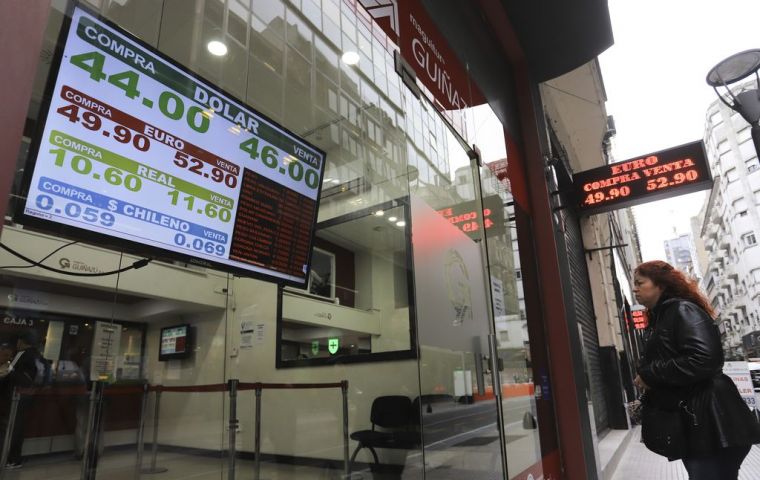MercoPress. South Atlantic News Agency
With markets and assets falling, Argentina becomes a magnet for bargain hunters
 Some of the bargains: 16.2% on dollar bonds maturing in three years or, better yet, 17.8% on bonds due in two. At a time when benchmark U.S. Treasuries yield 2.5%
Some of the bargains: 16.2% on dollar bonds maturing in three years or, better yet, 17.8% on bonds due in two. At a time when benchmark U.S. Treasuries yield 2.5%  These are “mouth-watering rates” especially from a nation that has a record US$ 56 billion loan from the IMF, a narrowing fiscal deficit and even a trade surplus
These are “mouth-watering rates” especially from a nation that has a record US$ 56 billion loan from the IMF, a narrowing fiscal deficit and even a trade surplus  Likewise Macri might lose a re-election bid in October to his populist predecessor, Cristina Fernandez de Kirchner.
Likewise Macri might lose a re-election bid in October to his populist predecessor, Cristina Fernandez de Kirchner. Argentine assets have tumbled so far, so fast that a few stout-hearted investors say it might be time to buy. “Find me a high-yield sovereign country with an IMF program paying so generously,” said Jean-Dominique Butikofer, the Atlanta-based head of emerging-market fixed income at Voya Investment Management, which oversees about US$ 205 billion.
“We can agree on the growth outlook, inflation running unexpectedly out of control, the debt dynamic after currency depreciation and worrying technicals. But at these levels, value has been created.”
He means numbers like these: 16.2% on dollar bonds maturing in three years or, better yet, 17.8% on bonds due in two. At a time when benchmark U.S. Treasuries yield 2.5% and bonds in more stable emerging-market peers like Chile just 4%, these are mouth-watering rates -- especially from a nation that has a record US$ 56 billion loan from the International Monetary Fund, a narrowing fiscal deficit and even a trade surplus.
“I would be very reluctant to be completely out of Argentina here,” Paul McNamara, London-based investment director at GAM, which oversees about US$ 135 billion, said in an interview. “The currency is cheap, and unlike when this happened last year they have a huge external trade surplus.”
Naturally, there are plenty of things to worry about. There’s Argentina’s history as a serial defaulter, for one. It stiffed bond investors for 15 years until finally reaching a settlement in 2016, months after market-friendly President Mauricio Macri took office. Its peso lost more than half its value last year and is on track to score a three-peat as the world’s worst-performing major currency in 2019.
And perhaps most importantly, there’s the threat that Macri might lose a re-election bid in October to his populist predecessor, Cristina Fernandez de Kirchner. Concern about her return to power after polls showed her approval rating is now above Macri’s sparked this week’s rout.
Argentine assets briefly rebounded Friday morning, only to erase the gains by midday. The peso was on track to close at a record low of 45.95 per dollar, government bond yields returned to 17% after dropping as low as 15% and the chance of a default, as measured by credit-default swaps, rose to 57%.
With six months to go until the election, Macri’s popularity has taken a hit as the economy endures the second recession of his presidency with an inflation that’s above 50%, prompting the government to announce price controls that some analysts said smacked of panic.
But Jaime Duran Barba, who has accompanied Macri throughout his political career, says investors exaggerated -- focusing on polls now, he says, ”it's absurd”
Emerging markets are all about volatility, said Jan Dehn, London-based head of research at Ashmore Group Plc, which oversees about US$ 85 billion.
“If you get afraid of market volatility you should not be in this business,” Dehn said. “Volatility is a permanent feature of life in EM, but we know that permanent losses are tiny in comparison. Volatility is, in almost all cases, absolutely your best friend.”
Local investors are also seeking bargains. Argentina’s state pension fund on Thursday bought so-called local law bonds -- dollar bonds sold only domestically -- due in 2020 and 2024.




Top Comments
Disclaimer & comment rules-

-

-

Read all commentsLol. The spectre of KFC re emerging has spooked the markets and vultures and Banksters are circling.
Apr 28th, 2019 - 09:03 am +1@Enrique Massot
Apr 29th, 2019 - 02:38 am 0REF: ”What would (KFC) have to do”:
Importing chicken from Argentina at throw-away prices may be an excellent Business-Opportunity! Don't you think so?
Of course, none of these “investors” are lending money to Argentina because they are enamoured in the country. Welcome to human nature, I'd say.
Apr 29th, 2019 - 03:19 am 0And only complete morons, some of them posting on this site, believe int'l lending practices would be any better if they somehow were made illegal or got curbed in any way. As expected from any adult, Argentina signed the dotted line and should be well aware what it means to borrow money.
I am, however, shocked at the gutless and infinitely incompetent governance of the Macri gov't. In only three years they've managed to destroy Argentina's economy - or what was left of it after 12 years of the Kirchner kleptocracy anyway. And the worst of all: The Macri gov't did it falsely on the behalf of economic liberalism, thus condemning Argentina to yet another bout with destructive populism.
Only the end game of this cycle is left and it won't be pretty. More than any time before, I feel there's no hope at all for this country.
Commenting for this story is now closed.
If you have a Facebook account, become a fan and comment on our Facebook Page!